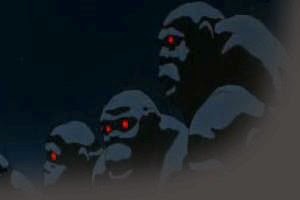While watching Princess Mononokei, there was one key element that I kept being drawn
to. This was the battle between and industrialized
civilization and nature. This conflict
was presented through many lenses in both the film’s plot and characters, but
also through its setting and scenery. The
use of scenery and the contrast it creates was what really fascinated me about
this film. An example of this is the
contrast between The Iron Works, and the nature surrounding it (seen in the picture
below). The Iron Works’ is portrayed
using only light and dark colors, more specifically black and brown, which is
coupled with the intense detail of the town’s defenses and buildings to give
off an ominous and intimidating aura. This
is contrasted with the nature background which gives off quite the opposite
aura by not being too detailed and using brighter colors, such as different
shades of green and light gray. Additionally,
the way the smoke that lifts off The Iron Works, and the slight green coloring
on its hill side, almost make it appear that there is already a battle being
waged between these two forces.
I also feel that this conflict can be seen as the
creativity of nature versus the rigidity of civilization. The Komda or tree spirits, as seen below,
embody the creativity of nature through their depiction of an abstract concept,
spirits, in a meaningful and entertaining way. Additionally, the Komda embody this creativity
because despite sharing a common form, they’re all unique in both their
appearance and movements. On the other
hand, the ape spirits that surround The Iron Works embody the lack of
creativity civilization brings. These
spirits are very dark and obscured during the film, and their red eyes are the
only semi-interesting aspect of them.
They also have a strikingly similar appearance which depicts the
uniformity that society impresses upon us.
It is next to impossible to ignore the plot’s role
in this battle between civilization and nature.
Ashitaka interprets this battle as a conflict between humans and nature
spirits, and throughout the film he attempts to restore a balance between these
two forces. In essence, I believe that
there is one all-encompassing conflict in this film which still is and always
will be applicable to real life. This is
the battle between nature’s creativity and power, and humankind’s unimaginative
and destructive power. In my opinion, Ashitaka’s solution to this conflict is
simple and should be employed more in real-life situations. This solution is to find a balance between
these two forces, because one cannot exist without the other.



No comments:
Post a Comment